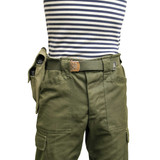Fashioning a Greener Tomorrow: The Rise of Sustainable Fashion
In recent years, a significant shift has taken place in the fashion industry as consumers increasingly recognize the environmental impact of their choices. This growing awareness and concern for the planet have given rise to a demand for sustainable and eco-friendly fashion. Today, we delve into the realm of sustainable fashion, exploring the practices and brands that are paving the way for a more ethical and environmentally conscious industry.
The Green Revolution in Fashion:
Fashion, once synonymous with fast trends and disposable culture, is experiencing a transformation towards sustainability. This movement is driven by a collective understanding that our choices as consumers have far-reaching consequences. From the production processes to the end life of garments, sustainable fashion aims to minimize the ecological footprint of the industry.
Ethical Production Practices:
One of the pillars of sustainable fashion lies in ethical production practices. Brands committed to sustainability prioritize fair labor conditions, ensuring that the individuals involved in the production chain are treated ethically and paid fairly. This not only promotes social responsibility but also contributes to the overall well-being of communities involved in the fashion supply chain.
Eco-Friendly Materials:
Sustainable fashion champions the use of eco-friendly materials, steering away from traditional, resource-intensive fabrics. Brands are increasingly turning to organic cotton, hemp, recycled polyester, and innovative materials like Tencel and Piñatex (made from pineapple fibers). These materials not only reduce the environmental impact but also encourage a shift towards a circular fashion economy.
Transparency and Traceability:
Consumers are now demanding greater transparency from fashion brands regarding their supply chains. Sustainable fashion brands embrace this transparency, providing consumers with insights into the entire production process. From raw material sourcing to manufacturing and transportation, traceability ensures accountability and builds trust between brands and consumers.
Leading the Charge: Brands Making a Difference:
- Patagonia: A pioneer in sustainable fashion, Patagonia is known for its commitment to environmental and social responsibility. The brand focuses on repairing and recycling garments, minimizing waste and promoting fair labor practices.
- Stella McCartney: Renowned for cruelty-free and sustainable fashion, Stella McCartney uses vegetarian leather alternatives, advocates for ethical production, and prioritizes circular fashion principles.
- Reformation: This brand has made a name for itself by creating chic, eco-friendly clothing. Reformation emphasizes sustainable fabrics, eco-friendly packaging, and a commitment to water conservation.
- Eileen Fisher: With a focus on timeless design, Eileen Fisher promotes sustainable and organic materials. The brand also supports initiatives for recycling and upcycling old garments.
Empowering Consumers to Choose Differently:
As consumers, our choices hold immense power. By opting for sustainable fashion, we contribute to a shift in the industry's dynamics. Supporting brands that prioritize ethical and sustainable production practices sends a powerful message – a message that resonates with our commitment to a greener, more sustainable future.
In conclusion, the rise of sustainable fashion reflects a positive evolution in the industry. As consumers continue to advocate for change, brands responding to this call are not only shaping the fashion landscape but also contributing to a more environmentally friendly world. Together, through conscious choices and support for sustainable practices, we can fashion a greener tomorrow.







